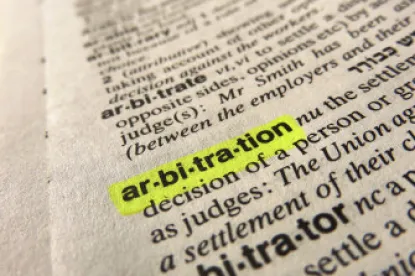In the United States, parties may agree in their contract not only to submit future disputes to arbitration but to also submit “arbitrability” questions to an arbitrator. In practice, such delegation (if properly made) means that the tribunal, instead of the court, would decide not only the merits of the parties’ dispute but also the threshold arbitrability questions that may arise, such as whether the parties have agreed to arbitrate or whether their arbitration agreement applies to and covers the particular dispute between the parties.
Thus, for example, the parties’ arbitration clause may provide that any dispute arising under the parties’ contract, except for actions seeking injunctive relief, shall be resolved by binding arbitration. One party initiates an action in court arguing that the dispute is the type carved out of the arbitration clause, while the other party moves to compel arbitration arguing that the dispute falls under the arbitration clause. Does the court or the arbitrator decide whether the parties’ dispute is within the scope of the arbitration clause and shall be arbitrated?
On January 8, 2019, in the first opinion authored by Justice Brett Kavanaugh, the Supreme Court issued a unanimous decision regarding the courts’ role when the issue of arbitrability is raised. In Henry Schein, Inc. v. Archer and White Sales, Inc., the Supreme Court ruled that in those cases where the parties have delegated the question of arbitrability to an arbitrator, a court has no power to decide the arbitrability issue. No. 17-1272, 2019 WL 122164 (Jan. 8, 2019). This ruling confirmed the long- recognized principle in the United States that the delegation of arbitrability issues to the arbitrator divests the court of the power to address the issue. As a result, the Supreme Court also ruled that, where there has been such a delegation of the arbitrability question to the arbitrator, a court may not fashion exceptions that would allow the court to nonetheless address the arbitrability issue. The Court’s ruling resolved a split created by a number of lower courts that had developed a conflicting line of authority whereby the court rather than an arbitrator decides the arbitrability question in cases where, under the contract, the argument that the arbitration agreement covers the particular dispute is “wholly groundless.” Those courts had reasoned that this so-called “wholly groundless” exception enabled courts to prevent “frivolous” attempts to submit disputes to arbitration. The Supreme Court’s ruling found the “wholly groundless” exception to be inconsistent with the text of the US Federal Arbitration Act and with the Court’s own precedent. Thus, the parties’ delegation of arbitrability issues to the tribunal renders the court powerless to decide the question of arbitrability even where the court otherwise would have found the argument in favor of arbitrability wholly groundless or frivolous.
Given the consequences of delegating arbitrability to an arbitrator, it is important to consider and clearly address this issue in the drafting of the arbitration clause. Under other existing U.S. case law, parties are presumed not to have agreed to submit the question of arbitrability to arbitration unless there is a “clear and unmistakable” evidence that they have done so. The Supreme Court expressed no views about whether the contract at issue in Henry Schein had met this “clear and unmistakable” standard by adopting the AAA Arbitration Rules (which provide that an arbitrator has authority to determine its own jurisdiction) or otherwise. This question—whether adoption of arbitration rules that authorize an arbitrator to determine its own jurisdiction qualifies as “clear and unmistakable” delegation—would first have to be addressed by the lower courts on remand from the Supreme Court.



 />i
/>i

